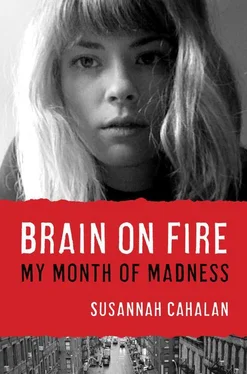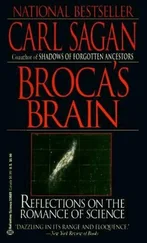I exhaled angrily. My mom understood that I was deeply frustrated by my inabilities and by being babied. Hannah sensed my irritation and distracted me with a month’s worth of US Weekly magazines and the copy of Catcher in the Rye that I had begged her for. Because I could no longer read on my own, Hannah read to me until I closed my eyes to sleep. Suddenly, though, I looked up at her.
“Tlantyoiforslen,” I said. “Tlantyoiforslen! Tlantyoiforslen!” I began repeating over and over, my face reddening.
“You’re welcome,” Hannah said, uncertainly.
I shook my head violently. “No, no, no!”
“Tlantyoiforslen!!!” I yelled. Hannah bent down closer to my face, but proximity only made me more unintelligible. I began pointing emphatically toward the door.
“Slefeen, sleefen!”
Finally, Hannah understood. She called Stephen in, and when I saw him, I instantly calmed.
The next day, taking a cue from my high white blood cell count, the doctors began looking for the source of my infection. A new set of blood tests was pending, so Nurse Edward came to draw blood. Stephen sat beside me, impressed by my demeanor today. Though I was far from my old self, bits of my old humor seemed to have resurfaced. I smiled more, and appeared more engaged with the Yankees game, even commenting that I loved pitcher Andy Pettitte.
“How’s the game?” Nurse Edward asked. “Are the Mets winning?” He made a joke. I held out my arm. I had done this so many times that it was all rote now. Edward put on his gloves; placed a tourniquet around my right forearm; prepped the vein, tapping it with his fingers; and bent down to insert the needle. But as the needle punctured my skin, I jumped up violently and in one quick motion slapped the needle out of his hand, sending blood spurting out of my vein. I smiled, looking down in mock sheepishness, as if to say, sarcastically, “Oops, what have I done?” It was obvious to Stephen that I meant, “Fuck off.” Sometimes when I seemed to be doing better, the original psychosis would return. This frightened everyone.
“Susannah, please don’t do that. You can really get hurt and maybe hurt me. But it’s going to hurt you a lot more,” Edward said, keeping his voice under control. He prepared the needle again and raised it over my outstretched arm.
“Okay,” I said mildly. He inserted the needle, withdrew a few tubes of blood, and walked out of the room.
“Waher,” I moaned, pointing to a pink pitcher on my bedside table. It was the day we were finally expecting Dr. Najjar to make an appearance. I was drooling and smacking my lips, a habit that now went on constantly, even while I slept. My dad put down his playing cards, picked up the pitcher, and walked out to the hallway to refill it. He returned to find me staring straight ahead. It seemed as if I were sleeping with my eyes open, my tongue hanging out of my mouth. By this point, he was so used to these scenes he took it all in stride. Instead of waking me, he silently read A Portrait of the Artist as a Young Man until my mother arrived.
“Hello,” my mother said cheerily, entering the room. She propped her leather bag on the chair by the bed and kissed me. “I’m so excited to finally meet the mysterious Dr. Najjar today. What do you think he’ll be like?” she continued brightly, enthusiasm radiating from her almond-shaped eyes. “He should be here any moment.”
Enthusiasm was hard for my dad this morning. “I don’t know, Rhona,” he said. “We don’t know anything yet.”
She shrugged him off and grabbed a tissue to wipe the drool pooling on the side of my face.
“Hello, hello!” A few minutes later, Dr. Najjar strode into my private room, 1276, his voice booming. He had a measured gait and a slight slope to his back that made his head fall a few inches in front of his body, most likely due to the hours he spent hunched over a microscope. His thick mustache was worn at the tips from his habit of twisting and pulling at it when he was deep in thought.
He extended his hand to my mother, who, in her eagerness, held it firmly a bit longer than normal. Then he introduced himself to my father, who rose to greet him from the chair by my bed.
“Let’s go through her medical history with you before I begin,” he said. His Syrian accent hopped rhythmically, sticking on and accentuating the hard consonants, often turning t’s into d’s. When he got excited, he dropped prepositions and combined words, as if his speech could not keep up with his thoughts. Dr. Najjar always stressed the importance of getting a full health history from his patients. (“You have to look backward to see the future,” he often said to his residents.) As my parents spoke, he took note of symptoms—headaches, bedbug scare, flulike symptoms, numbness, and the increased heart rate—that the other doctors had not explored, at least not in one full picture. He jotted these all down as key findings. And then he did something none of the other doctors had done: Dr. Najjar redirected his attention and spoke directly to me, as if I was his friend instead of his patient.
One of the remarkable things about Dr. Najjar was his very personal, heartfelt bedside manner. He had an intense sympathy for the weak and powerless, which, as he told me later, came from his own experiences as a little boy growing up in Damascus, Syria. He had done poorly in school, and his parents and teachers had considered him lazy. When he was ten, after he failed test after test in his private Catholic school, his principal had told his parents that he was beyond help: “Education is not for everyone. Maybe it would be best for him to learn a trade.” Angry as he was, his father didn’t want to stop his schooling—education was far too important—so although he didn’t have high hopes, he put his son in public school instead.
During his first year at public school, one teacher took a special interest in the boy and often made a point to praise him for his work, slowly raising his confidence. By the end of that year, he came home with a glowing, straight A report card. His father was apoplectic.
“You cheated,” Salim said, raising his hand to punish his son. The next morning, his parents confronted the teacher. “My son doesn’t get these types of grades. He must be cheating.”
“No, he’s not cheating. I can assure you of that.”
“Then what kind of school are you running here, where a boy like Souhel can get these kinds of grades?”
The teacher paused before speaking again. “Did you ever think that you might actually have a smart son? I think you need to believe in him.”
Dr. Najjar would eventually graduate at the top of his class in medical school and immigrate to the United States, where he not only became an esteemed neurologist but also an epileptologist and neuropathologist. His own story carried with it a moral that applied to all of his patients: he was determined never to give up on any of them.
Now, in my hospital room, he crouched down beside me and said, “I will do my best to help you. I will not hurt you.” I didn’t say anything, looking emotionless. “Okay, let’s begin. What is your name?”
A considerable pause. “Su… sa… nnn… aaah.”
“What is the year?”
Pause. “2009.” He wrote down “monosyllabic.”
“What is the month?”
Pause. “Appril. Appril.” I struggled here. He wrote “indifferent,” meaning apathetic.
Читать дальше













